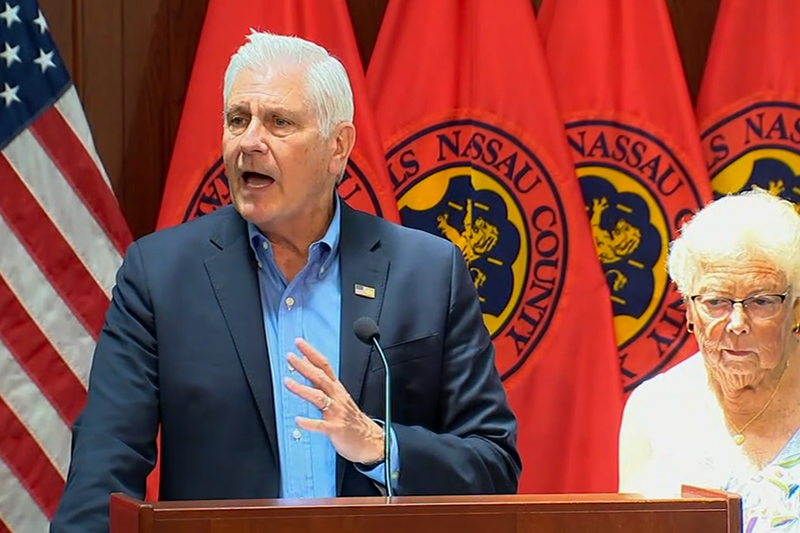Montana governor signs bill barring transgender athletes from sports teams aligning with their gender identity
Bill marks the third anti-LGBTQ measure signed into law by Gov. Greg Gianforte in the past two weeks.

Montana Gov. Greg Gianforte (R) signed yet another anti-LGBTQ bill into law, this time targeting transgender athletes by barring them from competing on sports teams that align with their gender identity.
Gianforte previously signed a so-called “religious freedom” bill that critics say would allow businesses and individuals to deny goods or services to LGBTQ people — and other groups — and using one’s moral or religious beliefs to justify the discrimination after the fact.
He also signed a law requiring transgender people to provide proof of gender confirmation surgery — which may be unnecessary to treat gender dysphoria — in order to change the marker on their birth certificate to reflect their true gender.
With Gianforte’s signature into law, Montana becomes the seventh state to impose some form of restriction on transgender athletes. Republican governors in Alabama, Arkansas, Mississippi, Tennessee, and West Virginia have signed similar bills into law.
South Dakota Gov. Kristi Noem (R) issued an executive order earlier this year barring transgender females from competing in women’s sports at the middle and high school and collegiate levels after lawmakers refused to adopt fixes to a proposed ban that Noem suggested in order to avoid a backlash from the NCAA.
Supporters of the bill have argued that bans on transgender athletes are necessary to preserve the integrity of sports and ensure that cisgender female athletes have an equal chance to compete and succeed in sports.
State Rep. John Fuller (R-Whitefish), the bill’s chief sponsor, argued that “allowing males to compete as women in female sports will result in women once again being shouldered aside to stand below the awards podium and forced to cheer the accomplishments of men,” according to The Associated Press.
But opponents have argued that there is little evidence showing that transgender athletes succeed at a higher level than their cisgender peers in most states. In fact, lawmakers in various states have proven unable to cite instances in their own states where a transgender athlete disadvantaged a cisgender athlete.
Instead, proponents of the bill have pointed to the case of two former transgender athletes who won track titles in Connecticut — the subject of a lawsuit that was recently dismissed on technical grounds — as the sole example.
Opponents also worry that bills like the one signed by Gianforte will provoke a backlash from the NCAA, the lead collegiate sports organization, which could choose to relocate tournaments or championship games from states that pass laws restricting the ability of transgender athletes to compete.
That concern was chief among the reasons why North Dakota Gov. Doug Burgum (R) and Kansas Gov. Laura Kelly (D) vetoed similar measure in their own states.
See also: Fox News is “obsessed” with trans student athletes, but can’t provide evidence of a problem
The NCAA has warned cities seeking to host NCAA events that they must “commit to providing an environment that is safe, healthy and free of discrimination” for athletes and fans alike, in order to be rewarded with the opportunity to host sporting events.
The NCAA’s board of directors says it will continue to “monitor” similar laws in other states to determine if events should be relocated to other venues.
Alex Rate, the legal director of the American Civil Liberties Union of Montana, called the law “patently unconstitutional,” and predicted that there would be legal action in the future challenging such bans. A similar law passed last year in Idaho has been blocked from taking effect by a federal judge.
Under one provision in the bill, the newly-signed law would become void if the federal government withholds education funding from the state for sex-based discrimination, and if an appeal by the state fails.
“This bill unfairly targets trans youth and puts millions of federal education dollars at risk,” Shawn Reagor, the director of equality and economic justice with the Montana Human Rights Network, told The AP. “It is unnecessary and harmful policy that comes at a massive cost to the state.”
Read more:
Man stabbed with ice pick on New York subway after attacker calls him a “f—-t”
UNAIDS Ambassador: Eliminating bans on gay sex are crucial to fighting spread of HIV
Atlanta police warn that robbers are using gay dating apps to target victims
Support Metro Weekly’s Journalism
These are challenging times for news organizations. And yet it’s crucial we stay active and provide vital resources and information to both our local readers and the world. So won’t you please take a moment and consider supporting Metro Weekly with a membership? For as little as $5 a month, you can help ensure Metro Weekly magazine and MetroWeekly.com remain free, viable resources as we provide the best, most diverse, culturally-resonant LGBTQ coverage in both the D.C. region and around the world. Memberships come with exclusive perks and discounts, your own personal digital delivery of each week’s magazine (and an archive), access to our Member's Lounge when it launches this fall, and exclusive members-only items like Metro Weekly Membership Mugs and Tote Bags! Check out all our membership levels here and please join us today!

























You must be logged in to post a comment.